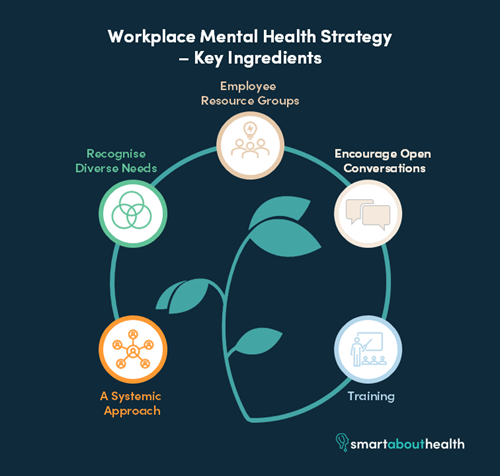Building an effective wellbeing strategy

This practical guide to prioritising mental health in the workplace and building an effective wellbeing strategy has been written by Dr Beverley Flint, Clinical Psychologist and Chief Mental Health Programme Officer at Smart About Health.
Dr Flint was a guest speaker at Allen Associates HR Hub to mark World Mental Health Day 2024 and raise awareness of the issues affecting employees’ wellbeing and how to tackle them effectively.
Prioritising mental health in the workplace
As the conversation around mental health continues to grow, it's becoming increasingly clear that addressing mental health in the workplace is a moral and ethical responsibility, as well as a business imperative. Evidence suggests that poor mental health costs UK employers £51 billion per year, according to a recent Deloitte report, highlighting the urgent need for effective strategies to support employees’ wellbeing. This report emphasises the following issues:
- The cost of poor employee mental health has decreased from £56bn in 2021, but increased from £45bn in 2019;
- 46% of working parents are concerned about their children’s mental health, costing UK employers £8bn annually due to impact on performance, taking time off work or leaving their roles;
- 63% of respondents are experiencing at least one characteristic of burnout, an increase from 51% in 2021;
- For every £1 spent on supporting the mental health and wellbeing of their workforce, employers get (on average) about £4.70 back in increased productivity.
The importance of addressing mental health in the workplace
Mental health difficulties affect one in four people each year in the UK, with many employees experiencing anxiety, depression, burnout or stress, which can significantly impact productivity and engagement. Additionally, according to the UK Health & Safety Executive, in 2022/23, stress, depression or anxiety accounted for 49% of all work-related ill health and 54% of all working days lost due to work-related ill health. The total number of working days lost due to work-related stress, depression or anxiety in 2022/23 was 17.1 million, equating to an average of 19.6 days lost per case. These figures illustrate the clear business case for prioritising mental health, not only to support individuals, embrace diversity and enable all employees to thrive at work, but also to enhance overall organisational performance and reputation.
In addition, prioritising and responding to the mental health and wellbeing needs of a workforce leads to higher job satisfaction, increased motivation, and improved employee retention. When workers feel valued and supported, they are more likely to contribute creatively and perform at their best. Creating a culture of openness about mental health and wellbeing contributes to reducing the stigma surrounding mental ill health, which in turn can encourage employees to seek help when needed, leading to earlier interventions and better outcomes.
Developing a wellbeing strategy to support mental health
To prioritise and promote good mental health in the workplace, as well as support employees who may experience poor mental health, a comprehensive workplace wellbeing strategy is key. This should, first and foremost, be informed by your data (eg absenteeism and staff turnover rates, engagement surveys), your employees (including Employee Resource Groups/Staff Networks) and your people managers. Other key ingredients are:
- Take a systemic approach: Implement systemic approaches to policy development, training and education. Use methods that include the life-cycle approach, intersectionality, employee experience from recruitment to retirement/offboarding, and preventative and proactive rather than reactive.
- Workforce diversity: Recognise, address and embrace the inter-generational and under-represented group differences and needs, as well as the needs of employees who have responsibilities outside of the workplace (eg parents & carers). A wellbeing strategy is incomplete without striving for equity and inclusion.
- Employee resource groups: Invest in Employee Resource Groups (ERGs) and appreciate the specific nuances of their particular needs to ensure that all people can thrive at work. Use co-production methodology to support and inform policies and procedures,
- Encourage open conversations: Promote senior leaders speaking openly about mental health to continue to reduce stigma and enable employees to request reasonable workplace adjustments in a timely and safe manner. Many people don’t know how to talk to people about mental health difficulties, resulting in these conversations being avoided. We need to increase people’s confidence via open conversations and training.
- Training: Managers play a critical role in supporting the mental wellbeing of their teams. Providing managers with training in recognising signs of mental distress, how to speak to their colleagues about their wellbeing, and knowing where to signpost them to for professional help can significantly improve outcomes. Training Wellbeing Champions across the organisation can also contribute to encouraging open conversations, ensure representation of a diverse workforce, and contribute to creating a culture of psychological safety where all employees are valued.
If time and resources are limited, seeking expert input to develop or update your strategy may be a sensible and more cost-effective approach to take.

Conclusion
Prioritising mental health in the workplace is not only about responding to mental health issues but also about creating an environment that recognises wellbeing needs, embraces diversity and enables all employees to thrive. By developing a comprehensive strategy, offering managerial and champion training, implementing preventative measures, and utilising the expertise and experiences of employees, businesses can support their workforce while boosting productivity and overall organisational health. Investing in prioritising mental health and wellbeing at work benefits everyone, resulting in work being a place that can be good for us.
Introducing Smart About Health
Smart About Health comprises a team of over 200 doctors and specialists delivering programmes, training, and supporting strategy development, entirely rooted in evidence, that support and improve the health and wellbeing of your workforce. We know that every organisation is unique and that different parts of your workforce need different approaches. So, we work with you, as partners, to build holistic solutions that are right for all your people. If you would like to have an informal discussion about how Smart About Health may be able to help you address the health and wellbeing needs of your workforce, please email us at contact@smartabouthealth.com
About the author
Dr Beverley Flint is the Chief Mental Health Programme Officer at Smart About Health, and a Consultant Clinical Psychologist with over 20 years of experience in the NHS and the private sector. She is registered with the Health and Care Professions Council and is a Chartered Psychologist with the British Psychological Society. Her recent focus has been on workforce psychology, supporting businesses to address the mental health needs of their workforce in a meaningful and effective way.
During her many years with the NHS, Bev provided input to individuals and multi-disciplinary teams in the context of long term physical health conditions, weight management, as well as an adult autism diagnostic service. Throughout her career, she came to appreciate the importance of sharing clinical expertise with non-clinicians in an accessible way to enhance knowledge and increase confidence in talking about a topic that many people avoid due to fear of ‘getting it wrong’.
